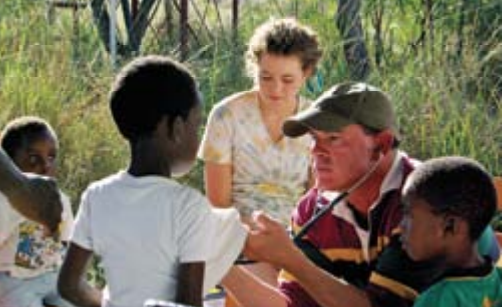Improving the lives of HIV-infected orphans in Zambia
In 2003, a woman with AIDS, seven months pregnant and living in a bus terminal in the Zambian capital of Lusaka, was found by nuns and brought to a shelter. After delivering the baby, physician Tim Meade and a team of volunteers looked after the child. Unable to care for her newborn son, the mother turned to “Dr Tim”. As a sign of gratitude, she named the boy Tim. Thus was germinated the idea for Tiny Tim & Friends (TT&F), an organization that specializes in paediatric HIV/AIDS clinical care.

HIV/AIDS takes an enormous toll on Zambia. In Lusaka, around one quarter of the adult population are infected and there are tens of thousands of AIDS-related deaths each year. Mother-to-child transmission is a major route of infection, with more than 14 000 children infected nationally in 2010, out of 80 000 newborns exposed. Tragically, the country is also home to a million AIDS orphans.
TT&F screens orphans for HIV in vulnerable communities surrounding Lusaka and provides anti-retroviral drugs, which suppress the HIV virus and stop the progression of AIDS. The charity currently serves almost 500 children and their caregivers through its medical and psychosocial care programme.
“Even a single article can change best medical practice on the ground in resource-poor settings”
Research4Life plays a major role in TT&F’s work, allowing research that informs the development of policies and medical procedures that provide the best possible treatment. Access to HINARI has also allowed the charity to obtain essential information about groups performing related research in similar settings. According to Dr Meade, this makes a big difference in resource-poor areas where published data are often unavailable. “Every issue of just three of the journals accessed through HINARI – AIDS, Journal of Infectious Diseases and Journal of Acquired Immunodeficiency – contain papers relevant to resourcelimited settings and TT&F’s work,” he says.
One of the key policies developed by Dr Meade and his team through their HINARI-assisted research is that mothers with HIV should continue to breastfeed their babies until two years of age, if stable on anti-retroviral medications. This allows children to thrive with minimal risk of the infection. Another is that social workers and their training are crucial to the success of TT&F – training and empowering them leads to the best outcomes for the mothers and children.
By providing high-quality medical care and personalized intensive adherence plans, TT&F allows patients to access the medical and social assistance they need, thus prolonging their lives and reducing the transmission of HIV in Zambia.
This story is part of the Making a Difference case study collection. Read more stories from Research4Life users.





